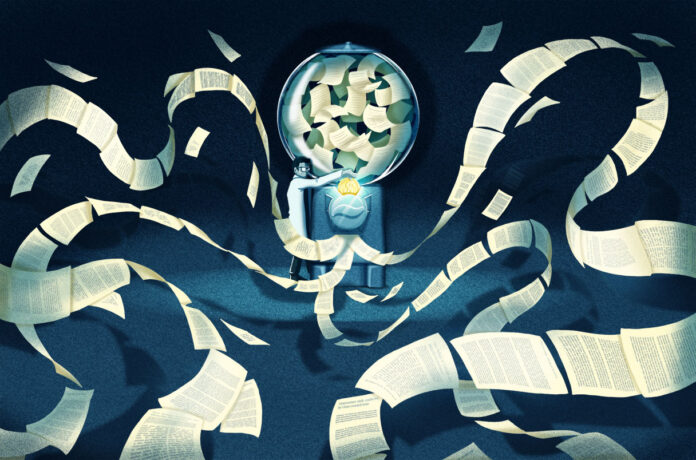A sprawling network of fake or biased scientific publications linked to Tenu.pro has infiltrated over 1,500 peer-reviewed journals. This disturbing phenomenon reveals the industrial-scale threat posed by so-called “paper mills” to both scientific integrity and public health.
A New Continent of Fabricated Knowledge
They sound legitimate, hyper-specialized titles, dense terminology, and promising research agendas. One discusses the earth’s crust beneath the Pre-Caspian basin. Another explores genome editing to improve barley wheat. A third examines migration policy in the EU during the COVID-19 pandemic. But despite their scholarly appearance, these are not genuine scientific contributions. They are the output of one of Europe’s most prolific academic fraud machines: Tenu.pro.
Unveiled in early September at an international conference in Chicago, the Tenu.pro network has, according to researchers, submitted over 8,000 articles to journals since 2017. Of those, 1,500 were accepted, some by respected publications. As Anna Abalkina, a researcher at the Free University of Berlin and lead investigator of the study, put it: “I was stunned by the scale.”
Svetlana Kleiner, head of research integrity at Springer Nature, echoed the alarm: “It is likely the largest single-entity academic fraud operation in Europe.” And unlike a previously documented paper mill in Russia, which submitted about 1,000 papers, Tenu.pro’s output is significantly more aggressive.
The Ukrainian Connection
The digital trail leads to a Kyiv-based company, Scientific Publication, which allegedly offered services to help scholars disseminate their work. In truth, it appears to be the corporate shell of a ghostwriting empire. The key? An email server: Tenu.pro. It was used to mass-submit fake articles and serves as the linchpin linking Scientific Publication to this sprawling fraud.
Publicly, the company denies any current ties to Tenu.pro—but, as Abalkina notes, the past tense in their denials leaves room for ambiguity. “They no longer use it, sure. But they didn’t say whether they used it before.”
Despite repeated attempts, France 24 received no response from Scientific Publication.
Fraud on an Industrial Scale
Tenu.pro is not an isolated case, it’s simply the most prolific. Nick H. Wise, research integrity officer at UK publisher Taylor & Francis, estimates there could be “tens of thousands” of fake scientific articles in circulation. “This is rotting the core of academic publishing.”
These operations are no longer amateurish. They function as organized, commercial enterprises offering pay-to-publish services. Clients—often real scientists desperate for credentials, pay to be listed as authors on papers fabricated by ghostwriters.
Rizqy Amelia Zein, a psychology researcher at Ludwig Maximilian University in Munich, explains that these paper mills repurpose existing research, tweak or rephrase content, and resubmit it as new work. Often, they mine freely available student theses online to construct new papers.
In the early 2000s, these frauds began with copy-paste techniques. Today, AI tools such as ChatGPT allow for instant, semi-coherent paraphrasing. “It takes 10 minutes to generate a paper that could be accepted by less rigorous journals,” says Zein.
Once created, these fraudulent works are marketed via Facebook groups, Telegram channels, and WhatsApp threads. Clients are then offered authorship slots for a price.
Buying Scientific Legitimacy: From €50 to $25,000
The pricing model varies. A minor citation in a conference paper may cost €50. Co-authorship in a mid-tier journal can exceed €1,000. Top-tier placements? Over $25,000.
And to boost chances of acceptance, these operations may go further: corrupt peer reviewers, suggest fake reviewers, or embed insiders into editorial boards. In one notorious case, a Chinese paper mill demanded $25,000 per article, banking on government bonuses that once promised six-figure rewards for publications in journals like Nature.
“The pressure to publish is what fuels this system,” says Enrico Bucci, a molecular biologist and scientific integrity expert. “In countries like Indonesia, where base salaries for scientists are minimal, publishing—even low-quality work—earns bonuses.”
The Collapse of Trust in Science
The ramifications go far beyond academia. “If scientific consensus becomes untrustworthy, who will the public believe?” asks Bucci. “In a vacuum of trusted knowledge, populist politicians like Trump can cherry-pick whatever ‘data’ fits their narrative.”
Medical research is particularly vulnerable. According to Abalkina, about 14% of all published cancer research papers may originate from paper mills. “That means treatments could be based on false data,” she warns. “Frankly, that makes me scared to get sick.”
Ultimately, the problem isn’t just technical, it’s systemic. The incentive structures that reward volume over quality are unsustainable. Without reform, warns Bucci, the entire scientific publishing ecosystem could collapse under the weight of its own fraud.



